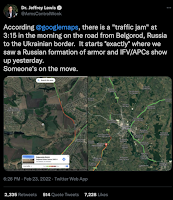Wars have a way of bringing out the best and worst qualities in humans. Courage, selflessness, loyalty, discipline, perseverance are all virtues that stand out. Likewise, the sins of man are on full display whenever there are wars, and are likely the cause of them. One of the things that makes the war in Ukraine so uniquely horrible is the amount of participants' personal data being captured, analyzed against social media sites, and then shared with family members and the public. Artificial intelligence, trained on billions of social media posts, can identify just about anyone and any military personnel today. Once identified, personal information can be associated with them and stories told - true or not.
Jack McDonald, a senior lecturer in war studies at King’s College London, was quoted by Wired as saying, "Openly publishing lists of your opponent[s], particularly at the scale that digital operations appear to allow, seems very new.” What kind of information is being shared with the public? Names, birthdays, passport numbers, job titles and photos of them in death.






